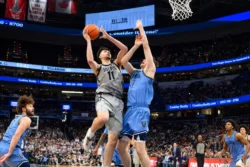The Chicago Cubs recently spent $18.5 million on talent that won’t even step foot on the field during his time with the team. In fact, he won’t even be in the dugout.
After being named the President of Baseball Operations for the Cubs, Theo Epstein has likely become Major League Baseball’s highest-paid executive. Not only are the Cubs paying a ludicrous fee for Epstein’s services, but they also have to compensate the Red Sox, for whom he had one year left on his contract. The Red Sox will probably receive a player from the Cubs for Epstein.
Can someone who will never set foot on the diamond really be worth the same to a team as someone who can throw a 95 mph fastball?
This odd transaction is just another example of front office executives making front page news, something largely unprecedented in previous generations.
With more exposure to the mainstream media, do front office executives really deserve all this attention? What is their actual value to franchises?
At $3.7 million per year, Epstein may seem expensive for someone who will spend two-thirds of his day on his Blackberry. But the guy is responsible for scouting and drafting young talent, and negotiating trades and deals with free agents. His skills in these areas could help the Cubs win their first World Series title in over a hundred years.
I’m not necessarily saying that Epstein himself is worth the fat paycheck. His nine years with the Red Sox were mixed, despite winning two World Series titles. He made some amazing moves, like trading shortstop Nomar Garciaparra in 2004 in one of the gutsiest GM moves ever. Nevertheless, he has made his fair share of blunders, especially with the signings of Carl Crawford and John Lackey over the past two years.
Breaking the 86-year curse that plagued the Red Sox was nothing short of incredible, but remember that Epstein always had a large payroll to work with–the third largest in 2011. I’d like to see him work with a more limited budget before I fully judge him as a GM. Still, he shouldn’t have too much trouble managing the Cubs’ payroll, as they are one of the best financed teams in the league.
Yet, the best are the ones who can produce Epstein-like results with fewer resources–a lot fewer.
Andrew Friedman, for example, has helped the Tampa Bay Rays to the playoffs in three of the last four years, including a World Series appearance. The Rays’ average payroll during that stretch was $55.2 million, well below the league average, and even more impressive was how they made the 2011 postseason after losing Carl Crawford and Carlos Pena to free agency. As far as I’m concerned, any GM who make sthe playoffs consistently with less than $60 million dollars is worth A-Rod money. Luckily for owners, the demand isn’t there and the best GMs remain vastly undervalued.
It will be interesting to see if the value of GMs continues to increase around baseball. Maybe the next generation will give up its dreams of hitting the game-winning home run in the World Series and instead hope to one day watch the team they built be crowned champions. While we are still a long way off from cherishing GMs as our heroes, there is no doubt of their growing influence over the game.
Do you find Moneyball as sexy as Nick does? Let him know at nberti@georgetownvoice.com





